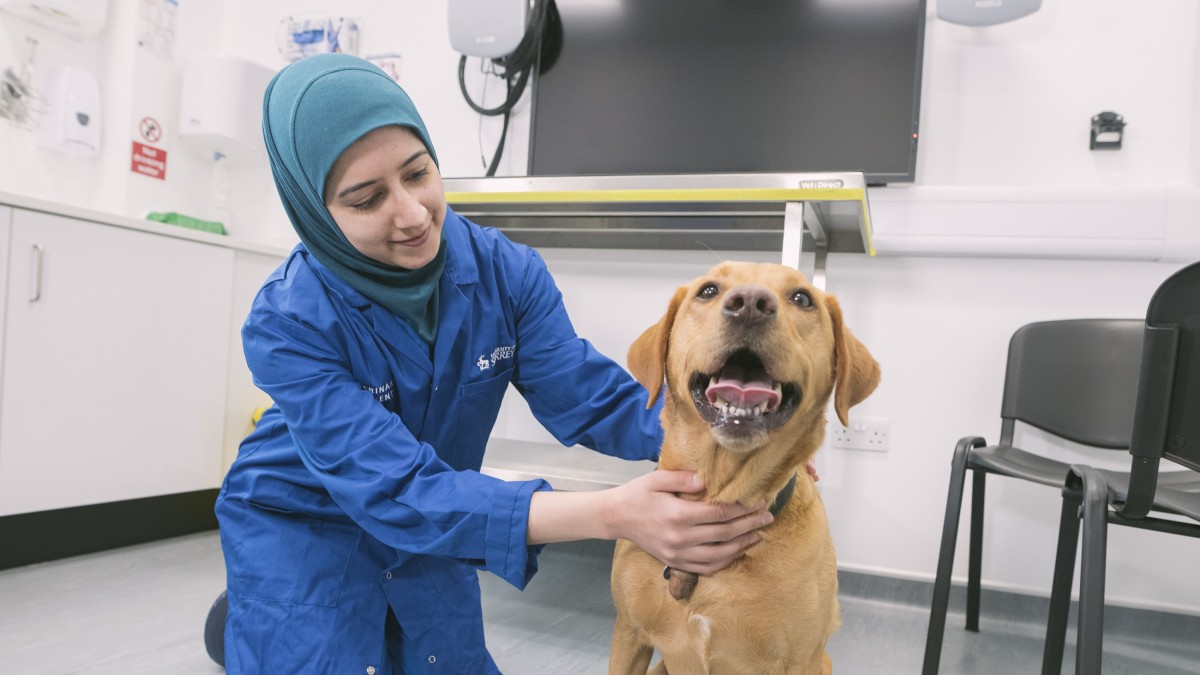Five reasons to study veterinary medicine and science at Surrey
On our Veterinary Medicine and Science BVMSci, ranked 4th in the UK (Complete University Guide 2026), we'll help you turn your passion for animals into a rewarding veterinary career.

At Surrey, you'll get hands-on experience with our teaching animals, including visiting dogs in Fledglings!
1. Study modules designed by practitioners
Our hands-on curriculum has been created in collaboration with our partnership of veterinary practices and scientific research institutes, ensuring everything you learn is multidisciplinary and relevant for your career in veterinary medicine. You’ll learn about different body systems, covering all common companion and production animal species, as well as wildlife and exotic species.
Throughout your studies, you’ll study topics that are fundamental to veterinary medicine, including:
- Anatomy
- Animal husbandry
- Pathology
- Pharmacology
- Surgery.
2. Access state-of-the-art facilities
As a veterinary medicine and science student at Surrey, you’ll benefit from hands-on learning in our multimillion-pound Veterinary Clinical Skills Centre. The Centre is fitted with latest industry equipment, including electrocardiogram (ECG) monitors and simulators, that you’ll use to practise anaesthesia, intravenous and urinary catheterisation, life support and resuscitation, suture placement, and venepuncture.
You’ll also have practical classes at our Veterinary Pathology Centre, home to our microscopy suites, pathology laboratories, post-mortem examination room and viewing gallery. Here you’ll learn about the anatomy of different species by watching dissections as they take place, with the opportunity to conduct your own too. In our Veterinary Biomechanics Laboratory, you’ll learn about animal movements, gait and posture adaptations, and how you can use gait analysis as a diagnostic tool.
3. Gain clinical experience
You’ll get the chance to work with animals in your first year, gaining hands-on animal experience within a few weeks of starting the course.
In your final year of study, you’ll complete seven intramural clinical placements, with one of our 100+ partner veterinary practices. You’ll be mentored by practitioners in small animal and equine general practice, emergency and critical care, production animal practice, and veterinary pathology and public health.
4. Learn from experts
We have a hands-on, clinical-led focus to our teaching, ensuring everything you learn is up-to-date and relevant to employers. You'll be taught by lecturers who possess a wealth of experience and expertise in their field.
These may include:
- Professor Kamalan Jeevaratnam – Head of the School of Veterinary Medicine and expert in clinical physiology and cardiology
- Professor Chris Proudman – expert in equine gastroenterology
- Professor Sarah Wolfensohn OBE – expert in animal welfare and consultant to the pharmaceutical industry, academia, animal welfare organisations, funding bodies and government
- Professor Nick Bacon – clinician and surgical oncology specialist
- Dr Martha Betson – expert in epidemiology of parasitic disease of humans and animals.
5. Enhance your employability
Our course is accredited by the Royal College of Veterinary Surgeons (RCVS), giving you the academic requirements needed to register as a veterinary surgeon once you graduate. 100% of our veterinary medicine and science graduates are in employment or further study within 15 months of graduating (Graduate Outcomes 2025, HESA) and you can find our alumni working in a range of jobs across the UK and beyond. This includes in veterinary practice, but also the pharmaceutical industry, academia and epidemiology, and in government at the Animal Plant and Health Agency (APHA) and the Department for Environment, Food and Rural Affairs (DEFRA).
Discover more about our Veterinary Medicine and Science BVMSci






